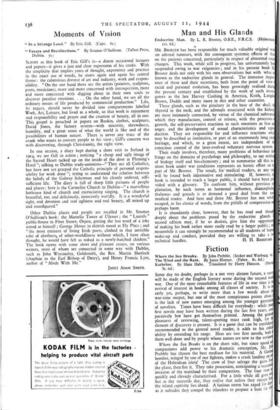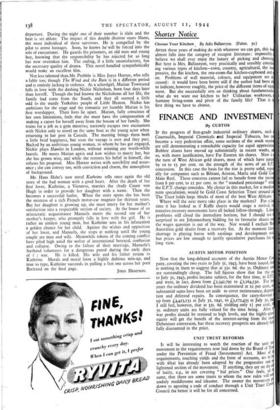Fiction
SOME day no doubt, perhaps in a not very distant future, a su will be made of the English literary scene during the second w war. One of the most remarkable features of life in war time is revival of interest in books among all classes of society. It is early . yet, perhaps, to write more than a few words about war-time output, but one of the most conspicuous points about is the lack of new names emerging among the younger genera of novelists. Times have been difficult for everybody: while first novels may have been written during the last five years, paratively few have got themselves printed. Among the gen pleasures of reviewing, talent-spotting must rank high, for element of discovery is present. It is a game that can be confid recommended to the general novel reader, it adds to his ability by extending his range. Here are two first novels, lx!th them well done and by people whose names are new to the revs Where the Sea Breaks is on the short side, but since speed compactness add power to his dramatic conception, Mr. Prebble has chosen the best medium for his material. A Ge bomber, winged by one of our fighters, makes a crash landing on of the Hebridean islets? The crew of four salvage the guns the plane, then fire it. They take possession, anticipating a 'suc invasion of the mainland by their compatriots. The four men quickly and cleverlly characterised. For a little while all goes but as day succeeds day, they realise that unless they escape the island captivity lies ahead. A furious storm has raged for di as it subsides they compel the islanders to prepare a boat for
departure. During the night one of their number is slain and the beat is set ablaze. The impact of this double disaster stuns Mann, the most individual of three survivors. He is compelled by the pilot to arrest hostages. Soon, he knows he will be forced into the role of executioner. He guards the prisoners, an old man and young boy, knowing that the responsibility he has rejected for so long has now overtaken him. The ending, if a little unsatisfactory, has the necessary quality of drama. This novel handled sympathetically would make an excellent film.
Not less talented than Mr. Prebble is Miss Joyce Homer, who tells a fable too; though The Wind and the Rain is in a different period and is entirely lacking in violence. As a schoolgirl, Marian Townsend falls in love with the dashing Nickie Nicholson, born four days later than herself. Though she had known the Nicholsons all her life, the family had come from the South, and they all seemed a little odd to the sturdy Yorkshire people of Little Heaton. Nickie has ambitions for the stage and the romantic yet humble Marian is his first worshipper. Their lives lie apart. Marian, fully conscious of her own limitations, feels that she must have the compensation of making a career for herself away from the bosom of her family. She trains for a job as a gym mistress; narrowly escapes two encounters with Nickie only to travel on the same boat as the young actor when returning to her post in Canada. The meeting brings them both a little brief happiness, but soon the voyage is over and they part. Backed by an ambitious young woman, to whom he has got engaged, Nickie plays Hamlet in London, without winning any worth-While laurels. He meets Marian again and now wishes to marry her, but she has grown wise, and while she restores his belief in himself, she refuses his proposal. Miss Homer writes with sensibility and assur- ance; she can convey too, with conviction and charm, the atmosphere of background.
Mr. Hans Habe's new novel Kathrine tells once again the old story of the bad woman with a good heart. After the death of her first lover, Kathrine, a Viennese, marries, the shady Count von Hugh in order to provide her daughter with a name. Then she .becomes a successful harlot. When the story opens she has beeh the mistress of a rich French motor-car magnate for thirteen years. But her daughter is growing up, she must marry for her mother's satisfaction into a respectable section of society. At the house of an aristocratic acquaintance Manuela meets the second son of her mother's keeper, who promptly falls in love with the girl. He is rather an aimless young man, but Kathrine sees in his infatuation a golden chance for her child. Against the wishes and opposition of her lover, and Manuela, she stops at nothing until the young couple are man and wife. Meanwhile tokens of the coming conflict have piled high amid the welter of international betrayal, confusion and collapse. Owing to the failure of their marriage, Manuela's husband volunteers for a dangerous patrol during the early days of t' war. He is killed. His wife and his father return to Kathrine. Morals and moral form a highly dubious mix-up, and true to type, Kathrine succeeds in pulling a fast one across her poor Bertrand on the final page.
JOHN HAMPSON. JOHN HAMPSON.



























 Previous page
Previous page